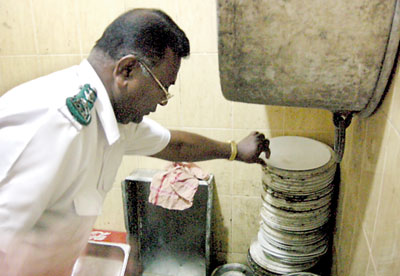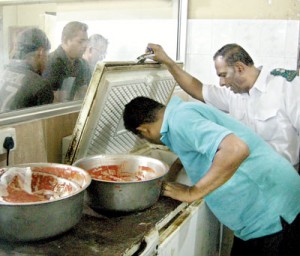News
Flies, rats and cats have a good feed, but not us
The half-full food cabinets of the small restaurant near the Pettah Railway Station are open and flies fly in and out to visit the exposed food. Right under the water boiler, massive tea strainer, stained black after repeated use and a pile of teacups is the uncovered rubbish bin.

PHIs doing the rounds checking on eating places. Pix by Athula Devapriya and Nilan Maligaspe
The diner is free to pick any of the sticky, dirt-stained six tables cramped in the six-by-six-metre shop space. With no ventilation or natural light coming in, one single bulb serves as the only light source even at noon. Two sweaty young men stand near the cash desk, eager to serve.
The Public Health Inspectors paid a visit even last week but found nothing wrong, claimed the cashier, who refused to give his name.
Near the Town Hall, another shop operates day and night to serve meals. Here too the food cabinets are rarely closed, and while many customers buy takeaways a few diners have the pleasure of the company of a number of stray cats that have made the restaurant their permanent home.
In another employee canteen at a private organisation employing more than 600 people the sight of large rats darting across the restaurant is common.
The food, brought in from an outside location, comes in large polythene bags and is emptied into the containers on display. Short-eats for sale are made by an individual who does her cooking at home; whether she sticks to specified standards is anybody’s guess.
 The hygiene standards of many other restaurants and eateries in Colombo are almost non-existent. The food handlers, who come from various parts of the country, have hardly any training for the job. Their health issues are ignored and most have no idea about health and safety standards that should be followed when serving, storing or preparing food in restaurants.
The hygiene standards of many other restaurants and eateries in Colombo are almost non-existent. The food handlers, who come from various parts of the country, have hardly any training for the job. Their health issues are ignored and most have no idea about health and safety standards that should be followed when serving, storing or preparing food in restaurants.
A number of initiatives by the Colombo Municipal Council (CMC) to improve the status of the restaurants have borne little results. This year alone 429 cases have been filed, with only 131 convictions. A majority of the cases has not been heard in courts yet, explained Dr. Ruwan Wijayamuni, the CMC’s Chief Medical Officer, adding that most would be heard only next year.
The CMC is faced with a toothless Food Safety Act, he said. The Act does not give authority for Public Health Inspectors (PHIs) to even temporarily suspend business in any restaurant found to be compromising food and safety standards.
Instead, the matter is taken to court.
“Often it takes more than six months for the case to be heard, and it also depends on the owner coming to court. According to the Act we have the responsibility for producing the owner, but with no police powers we are helpless,” Dr. Wijayamuni explained.
He believes urgent revision is needed to enable inspectors to enforce the law strictly.

Dr. Ruwan Wijayamuni
Even if a court order is eventually obtained for fines or closure, by that time the authorities often find the restaurant owners have changed, which makes the court order useless.
“We have to repeat the process all over again, and often with little success,” Dr. Wijayamuni said.
A new initiative by the CMC to register all food outlets and their workers has been greeted with hostility by some owners.
There is a high labour turnover in restaurants, especially in the small-scale saivar kades and teashops.
“Many of the workers who are employed come from the upcountry estate sector and on average remain in employment in one place for about six months,” explained an owner of restaurant in Colombo 2.
Criticising the move by the CMC which made medical testing and training compulsory for all food handlers employed in restaurants, he said owners had to spend more than Rs. 5,000 on each employee.
“Sometimes they are not even there for a month but the restaurant has to spend on them, which is very costly. Added to this, registration requires testing of all dishes available for sale. We have to spend about Rs. 20,000 for those tests alone. Earlier registration only cost Rs. 5,000,” he explained.
The restaurant owner believes that the CMC should enforce a law where food handlers should have to obtain a licence before entering into the industry.
“It is a cost each employee should bear, not the employer,” he said.
Next year, the CMC is determined to strictly implement the new licensing laws.
They plan to ensure all food handlers are given basic training and undergo medical checks before issuing them with fitness certificates. Given the low educational background of the majority of the food handlers, this would be a difficult task.
After registration is completed and licences are issued to restaurants regular monitoring will be needed to ensure the restaurants abide by the rules. PHI staffing is, however, only 40 per cent of the level needed to carry out this work.
With close to 1500 small food outlets operating in Colombo, the CMC will have to train and certify at least 6000 food handlers next year.Accepting the enormity of the task, with the added challenge of sensitizing a group with low education levels on safe food handling techniques and procedures, Dr. Wijayamuni said the process had to start somewhere.“We have already given notice to a number of outlets to improve their conditions and they are doing well, so I hope the trend continues,” he said ambitiously.

